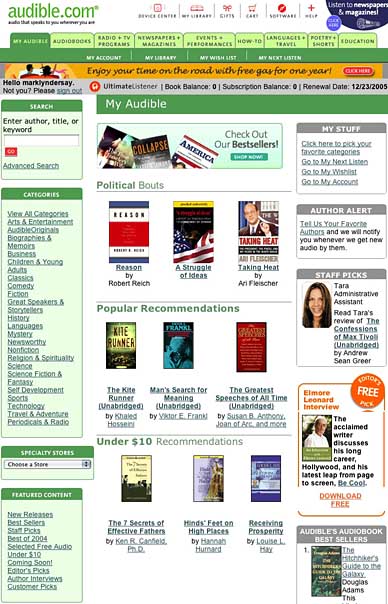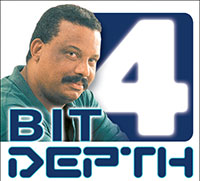BitDepth 464 - March 15
11/01/09 17:42 Filed in: BitDepth - March 2005
Audible.com is the go to source for first class reading material that's read to you.
Audiobooks revisited

Audible.com is the leader in modern audiobook distribution.
I've always loved reading, but the world has conspired to make more information available to me even as it steals the time I have left to investigate it. Between websites that I visit regularly, magazine subscriptions, daily newspapers and the must-read books that jump the long queue of everything else I've been waiting to read, I'd begun to be really depressed about the prospect of ever reading all the books I craved.
It was my curiosity about technology that led me to an Internet radio show that streamed content, but also made it available as a download in MP3 format. Streaming media never appealed to me. It was too much like conventional radio (much of it is conventional radio) in the way it tied me down to a particular place and time to listen. But an audio file freed me to listen anywhere I wanted.
Soon I was breezing through hours of collected material doing mundane tasks that hardly taxed my forebrain. The search was now on for more.
Enter Audible.com, the audiobook alternative to Amazon.com. Audible's premise is an elegant, 21st century solution to the traditional bulk of audiobooks, which have evolved over the years from monolithic stacks of vinyl to mountains of tape to shrinkwrapped bricks of CDs.
An Audible book is a downloadable file, a specially encoded MP4 audio document, compressed to different sizes, that you can play on your computer or on a wide range of portable digital music players.
The files are large, even if you opt for compact files and sacrifice audio fidelity. An 18 hour read, like Bill Bryson's hugely entertaining A short history of nearly everything can run 180MB at FM radio quality, but that book on CD would be spread over 14 discs, not the sort of thing you want to be sorting through while barrelling down the highway.
The files are also encrypted, making it difficult, though not impossible, to share your books. Audible allows you to license three devices for playback, but the encryption isn't impossible to crack, though it requires some manual labour that most readers won't have the stamina for.
My own experience with Audible has been overwhelmingly positive. My sole problem with billing was sorted out when I laid my woes before the company's CEO, Don Katz after exhausting the standard help systems. Katz took a personal interest in the problem and I got a call from a "Team Leader" (for transactions, I think), who tore through the problem like wet tissue paper.
Since December 2002, I've read 80 books I'd never have read otherwise, beginning with Shales & Miller's Live from New York right through to Adams' The Salmon of Doubt. I should say listened to, instead of read, because while I don't make the distinction in my head, it gets weird when someone asks to borrow the book I'm currently raving about.
Along the way, there have been some pleasant surprises (yes, Spider Robinson's Callahan books are as good as they are said to be) some astonishing revelations (you must read Schlosser's Fast Food Nation and Preston's The Demon in the Freezer) and some annoying disappointments.
Audiobooks now fill a the empty holes in my day when I'm left staring at the bumper in front of me on the highway. One day, they might fill the space between my ears.
Rules of thumb for audiobooks
Recent editions of these books avoid dramatizations in favour of quality readers who vary pitch, intonation and inflection subtly to help listeners follow the cast of characters. Only a few books benefit from ensemble voice acting and the only one that comes to mind right now is the reading of Orson Scott Card's Ender's Game series.
Author read books tend to be inferior productions, though some authors are more tolerable than others and authors like Bill Maher and Dennis Miller are standout exceptions.
Older self-help books tend to have the most obnoxious dramatizations, with dramatic orchestral crashes that are both awful and unnecessary. If this sort of thing annoys you, avoid all Star Trek audio books, where the budget allows only tinkly synthesizers.
For B-List audiobooks at bargain prices, try Fictionwise.com and Telltaleweekly.org.
What can I listen on?
An unencrypted MP3 audiobook will play on any common MP3 player, just as if it were a music file. Audible.com supports a wide range of players, including smartphones, many common MP3 players and PDAs. To transfer the files, you'll need to work with iTunes on the Mac or the Audible Manager on the PC which will allow you to set most common portable players as the destination for your new books.

Audible.com is the leader in modern audiobook distribution.
I've always loved reading, but the world has conspired to make more information available to me even as it steals the time I have left to investigate it. Between websites that I visit regularly, magazine subscriptions, daily newspapers and the must-read books that jump the long queue of everything else I've been waiting to read, I'd begun to be really depressed about the prospect of ever reading all the books I craved.
It was my curiosity about technology that led me to an Internet radio show that streamed content, but also made it available as a download in MP3 format. Streaming media never appealed to me. It was too much like conventional radio (much of it is conventional radio) in the way it tied me down to a particular place and time to listen. But an audio file freed me to listen anywhere I wanted.
Soon I was breezing through hours of collected material doing mundane tasks that hardly taxed my forebrain. The search was now on for more.
Enter Audible.com, the audiobook alternative to Amazon.com. Audible's premise is an elegant, 21st century solution to the traditional bulk of audiobooks, which have evolved over the years from monolithic stacks of vinyl to mountains of tape to shrinkwrapped bricks of CDs.
An Audible book is a downloadable file, a specially encoded MP4 audio document, compressed to different sizes, that you can play on your computer or on a wide range of portable digital music players.
The files are large, even if you opt for compact files and sacrifice audio fidelity. An 18 hour read, like Bill Bryson's hugely entertaining A short history of nearly everything can run 180MB at FM radio quality, but that book on CD would be spread over 14 discs, not the sort of thing you want to be sorting through while barrelling down the highway.
The files are also encrypted, making it difficult, though not impossible, to share your books. Audible allows you to license three devices for playback, but the encryption isn't impossible to crack, though it requires some manual labour that most readers won't have the stamina for.
My own experience with Audible has been overwhelmingly positive. My sole problem with billing was sorted out when I laid my woes before the company's CEO, Don Katz after exhausting the standard help systems. Katz took a personal interest in the problem and I got a call from a "Team Leader" (for transactions, I think), who tore through the problem like wet tissue paper.
Since December 2002, I've read 80 books I'd never have read otherwise, beginning with Shales & Miller's Live from New York right through to Adams' The Salmon of Doubt. I should say listened to, instead of read, because while I don't make the distinction in my head, it gets weird when someone asks to borrow the book I'm currently raving about.
Along the way, there have been some pleasant surprises (yes, Spider Robinson's Callahan books are as good as they are said to be) some astonishing revelations (you must read Schlosser's Fast Food Nation and Preston's The Demon in the Freezer) and some annoying disappointments.
Audiobooks now fill a the empty holes in my day when I'm left staring at the bumper in front of me on the highway. One day, they might fill the space between my ears.
Rules of thumb for audiobooks
Recent editions of these books avoid dramatizations in favour of quality readers who vary pitch, intonation and inflection subtly to help listeners follow the cast of characters. Only a few books benefit from ensemble voice acting and the only one that comes to mind right now is the reading of Orson Scott Card's Ender's Game series.
Author read books tend to be inferior productions, though some authors are more tolerable than others and authors like Bill Maher and Dennis Miller are standout exceptions.
Older self-help books tend to have the most obnoxious dramatizations, with dramatic orchestral crashes that are both awful and unnecessary. If this sort of thing annoys you, avoid all Star Trek audio books, where the budget allows only tinkly synthesizers.
For B-List audiobooks at bargain prices, try Fictionwise.com and Telltaleweekly.org.
What can I listen on?
An unencrypted MP3 audiobook will play on any common MP3 player, just as if it were a music file. Audible.com supports a wide range of players, including smartphones, many common MP3 players and PDAs. To transfer the files, you'll need to work with iTunes on the Mac or the Audible Manager on the PC which will allow you to set most common portable players as the destination for your new books.
blog comments powered by Disqus

